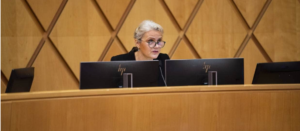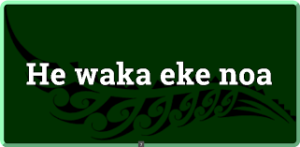The Tikanga Revolution – get in the waka now!
Tikanga Māori is applicable in NZ courts and equally, applicable to kaupapa Māori and generalist social, health and education services.
In our last post, we outlined the treatment of tikanga in Ngāti Whātua Orākei Trust v Attorney General – a Treaty-settlement case. In this post, we look at the Supreme Court’s treatment of tikanga in Ellis v The King and how it might be relevant to the delivery and dispute processes in social, health and education agencies.
Ellis v The King

Winkelmann CJ in Ellis v The King
Ellis v The King was an appeal to the Supreme Court against criminal conviction. The case had a 30- year, highly contentious history in Aotearoa. The Appellant passed away in 2019 after the Court had granted him leave to appeal but before the appeal was heard. An important first issue for the Court was therefore whether it should allow the appeal to continue posthumously.
The majority of judges (Winkelmann CJ, Glazebrook & Williams JJ) held that the appeal should continue. Their reasoning differed but all agreed that tikanga was relevant to the issue. They were assisted in their decision by a Statement of Tikanga that was agreed by parties through a wānanga involving Mātanga/experts in tīkanga.
Takeaways
To add to the observations made by the court in the Ngati Whatua case, here’s some of what the judges in the majority had to say about tikanga:
- Tikanga Māori refers to the values, standards, principles and norms that shape what Māori consider as the right and just way of doing things (Statement of Tikanga). It is not therefore just about rules. It’s also about giving practical effect to the principles.
- Tikanga should be respected and protected as a “system of law and custom in its own right.“(para 22) It was the first law of Aotearoa and continues to influence and regulate Māori lives. It is embedded in our culture and society and a unique component of our regulatory and statutory systems.
- How tikanga applies in a situation depends on the context. As noted previously, the context may be iwi and hapū specific or, as in Ellis, involve issues that are significant to both the justice system and tikanga.
- Tikanga is likely to be of more relevance and given most weight in a Te Ao Māori context where people expect tīkanga to be a controlling factor. In other situations, where different rules and principles apply, tikanga may be one of a number of considerations.
- When “what is the tīkanga” is in issue, it should be decided from a place of knowledge. In Ellis, the court was advised by an agreed Statement of Tikanga prepared by experts. Other options could be to consult with Māori stakeholders; convene a stakeholder hui; refer to authoritative texts and resources like Waitangi Tribunal reports and tikanga best practice guidelines.
- Tikanga can apply generally – ie not only to Māori and kaupapa Māori services but also to Pakeha and mainstream disputes and activities. In Ellis there was no evidence that either the appellant or the complainants were Māori. In a similar way, section 5 of the Oranga Tamariki Act makes concepts of mana, whakapapa and whanaungatanga applicable to Māori and non-Maori.
Relevance to social, health, education services

Under the Social Sector Accreditation Standards, Ngā Parewa Health and Disability Standard and Te Tiriti o Waitangi, the same recognition and respect for tikanga is expected of social, health, disability and education agencies.
Just how tikanga can be incorporated into service delivery will depend on the particular service context. Expert advice might be obtained, for example, about how manaakitanga can shape the support and delivery of services from the point of a client/whānau referral.
In Ellis, the experts advised and the Court agreed that the tikanga principles of whanaungatanga, whakapapa, mana and ea were relevant to the issue to be decided by the court. By analogy, these same concepts might guide the way in which health, disability, social and education agencies deal with complaints, adverse events, grievances, bullying, harassment and disputes.
Join the Waka

Call us now
The tikanga journey is fast-moving with exciting developments. It’s important to stay up with it, get educated, advised and to open up to doing things in a tika way.
Here, at the Policy Place, we are keen to be part of the tikanga revolution and to tautoko our clients in the waka of change.
Contact us if you want help with your policies and procedures.

